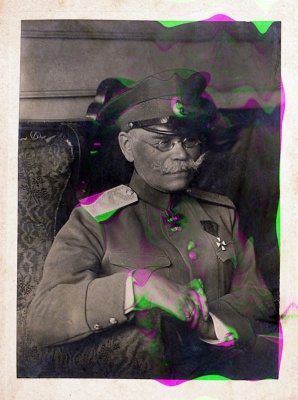I am tired, it’s late. Different people. Was busy with different things. Zenzinov came to visit. In the entryway, I did not fail to show him some clippings from “People Affairs” with its obviously mendacious words about Savinkov. He made excuses that in the report the words were misreported. See more


Also participating: Kaledin, Denikin, Milyukov, KornilovCommander in Chief of the Petrograd command - from 18 March 1917, Trubetskoy, Struve, Savinkov.
At nine o’clock we were told that a commissar of Kerensky’s called Kuzmin had come with a convoy of ten men and wanted to speak to us. Kuzmin took three papers out of his pocket which he read to us, one after the other. They said that in view of the possible disturbances, and because of the approach of KornilovCommander in Chief of the Petrograd command - from 18 March 1917, with the aim of restoring the monarchy, the Provisional Government thought it necessary to put (there followed each of our names) under house arrest and that the garrison at Tsarksoe Selo was charged with guarding us. See more
I came to the Winter Palace to a session of the Provisional Government in order to defend a bill on the death penalty behind the front line. Without a word, Kerensky held out a piece of paper covered in writing to me. I read it and could not believe my eyes. The gist of it was that the Commander-in-Chief is ordering the immediate transfer of complete military and civil authority to him. The signature of V Lvov was beneath this ultimatum. I advised Kerensky to come to an arrangement with Gen. KornilovCommander in Chief of the Petrograd command - from 18 March 1917.
According to Gorky, who had just arrived in Koktebel, the issue of the death penalty emerged, with Savinkov calling for its introduction in the rear and Kerensky expressing a desire to abolish executions once again. But, given that the introduction of the death penalty is essentially the abolition of lynch law (i.e., the selfsame death penalty, meted out for what are essentially insignificant instances of misconduct), it will undoubtedly be introduced sooner or later; the most terrible thing about revolutions is sensitivity: it always ends up yielding the bloodiest fruits. See more
Kerensky has certainly lost all sense of understanding. He is under cross influences. He opens himself almost to anything, almost like a woman. His domestic ways have also corrupted him. He has established (and he lives in the Winter Palace!) “court” orders, which adhere to miserable philistinism, parvenu. He has never been clever, but it seems that even ingenious intuition has abandoned him when festive, honey-feasting days have passed, and were replaced by severe (oh, how severe!) weekdays. See more
Boris Savinkov has visited us. He was sober and healthy. Our situation as he sketched out for us is dire. Here it is in brief: we are to expect territorial losses. In the north, Riga and further, up to Narva; in the south, Moldova and Bessarabia. See more
Letter to the Foreign Ministry
"Kerensky has formed a Government composed of six Socialist and eight non-Socialist members. Five of the latter belong to the Cadet party. Aksentieff, the president of the Council of Peasants, becomes Minister of the Interior, and Savenkoff, the former Terrorist, vice-Minister of War. KorniloffCommander in Chief of the Petrograd command - from 18 March 1917 is appointed Commander-in-Chief."
I’m lying face down on the grass. The grass is damp, still wet from the noisy midday rain. An ant is working exhaustedly right in front of my eyes. He drags a straw—it’s an unbearable burden. I examine him curiously. And him, and his straw, and the green stems of the grass, and the lumps of dried mud. All with curiosity. When I once expected a violent death, I skimmed “Niva.” with curiosity Is it because you read the Niva and follow an insignificant ant at these moments, that there’s no courage, no calm composure to understand to the end and measure of what we call death? See more
On July 29th Kerensky presided at a conference at G.H.Q., which was also attended by Tereshchenko and General Alexyeev; by General Brusilov and his Chief of Staff, General Lukhomski; by Generals Ruzski and Klembovski, former and present Com- manders-in-Chief of the Northern Front; by General Denikin, then Commander-in-Chief of the Western Front; and by Savinkov, Commissary of the South-West Front. See more
Our soldiers are in the city. They are not looting, though they are helping themselves to barrels of wine. Yesterday they showed great valour in storming Kalush, but today they drink like serfs. There are not too many of them, but the streets reek of spirit, shards of glass from shattered bottles litter the pavements, and the soldiers, dead-drunk and asleep with their rifles still in their hands, lie next to the rubbish.
The air in Petrograd is toxic with the fumes of words and the fog of anarchic thought. How easy it is to be a demagogue. How easy it is to whip up the crowd. Leaving Petrograd you realize the danger, the shame, the sadness and madness of it all. One must be brave; one must keep one’s faith.